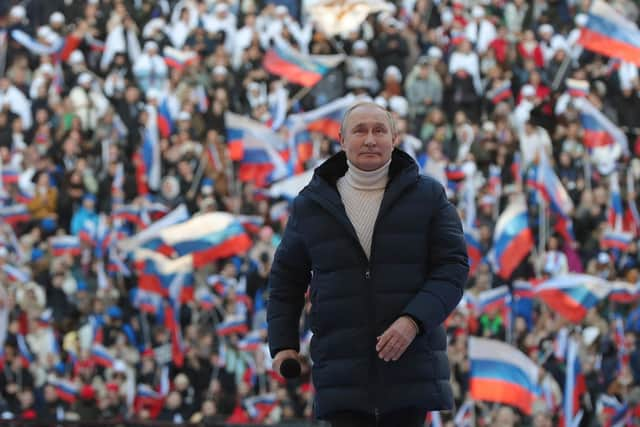Russia's war on Ukraine: World has no option but to fight delusional Vladimir Putin, however long it takes – Joyce McMillan
If so, that might be one reason why Putin’s war strategy has not yet involved bombing flat the extraordinary architectural heritage of one of the world’s great cities, built around a high bluff over the River Dnieper – a heritage glimpsed again this week on the world’s television screens, during President Joe Biden’s visit to Kyiv. It is poignant, now, to look at the travel websites that, just three years ago, were talking about “Kyiv’s moment” as a rising star in the global tourism market; but there can be no doubt about the pride Ukrainians take in their beautiful capital, and the extraordinary efforts that have been made – since the outbreak of Putin’s war a year ago today – to shore up and protect national treasures against the possibility of attack.
It was a dozen years ago, during the Russian-leaning presidency of Viktor Yanukovych, that I made my first and only visit to Kyiv; and although the capital and the country were at peace during that time, it was still possible to sense that same mixture of intense pride and constant foreboding, woven into the political and cultural life of the city. I was part of a group interested in the development of parliamentary democracy in Ukraine, during its first 20 years of independence; I also made a special detour to meet the director of the city’s explosively brilliant Theatre On Podil, which had thrilled Edinburgh Fringe audiences in 1996 with its spectacularly vivid version of Othello, staged in the stormy waters of the old Infirmary Street baths.
Advertisement
Hide AdAdvertisement
Hide AdAnd everywhere we went, we encountered the same vivid contrast between hard work and high hopes for the future, and outright fear that the old forces of Soviet oppression and corruption had not gone away, and were constantly seeking to disrupt the progress towards “normal” European democracy that most of the people we met in Kyiv, particularly those under 50, seemed passionately to want.
It was the younger generation in Kyiv that emerged onto the streets in the Maidan revolution of 2013-14, when Yanukovych’s refusal to sign a co-operation agreement with the European Union triggered what became a full-scale revolt, ending in Yanukovych’s eventual flight from the country. And always, the creative energy seemed to lie with that west-facing movement towards a new European future, as writers, artists, musicians and theatre-makers joined the Maidan protest, and over 100 young Ukrainians lost their lives, mainly in brutal assaults on the protestors by security forces.
After Russia’s post-Maidan annexation of Crimea in 2014, and the declaration of pro-Russian “autonomous areas” in Donetsk and Luhansk soon after, pro-western leaders at last began to attract clear majorities in Ukraine, culminating in 2019 with a landslide victory for the former actor, comedian and satirist Volodymyr Zelensky; it’s perhaps strangely fitting, given the evolution of Ukrainian politics over the last 30 years, that it was a figure shaped by the country’s vivid and brilliant cultural life who finally emerged, in the moment of crisis, as the war leader Ukraine needed.
Yet even after a year of such dreadful suffering, devastation and death, the old Ukrainian tension between the vibrant vision of a new future to which Zelensky looks, and the old forces that still resist and mistrust it, makes it all but impossible to see how Putin’s war in Ukraine will end. Experts often say that all wars end in negotiation, but that is not strictly true. The Second World War ended in the total defeat and surrender of the Axis powers, with the only peace negotiation taking place among the victorious Allies; and the people of Ukraine, heroically resisting invasion by a Russia now openly embracing fascist policies at home and abroad, could not be more convinced that they are now engaged in a similar battle against evil, which the world cannot afford to lose.
From this perspective – and it is strongly supported by most western observers of the war, of all political persuasions – negotiation with Russia is simply impossible, since the Putin regime is a brutal aggressor that cannot be trusted to abide by any peace deal; and complete victory, driving Russia out of all 1991 Ukrainian territory, is therefore seen as the only option.


Yet in this war, total military victory over Russia in the 1945 sense is not a real possibility. Even if Ukraine is eventually successful in regaining most of its lost territory – a process which could take years, and cost scores of thousands of lives – Russia will still exist, and eventually a negotiation will be necessary to guarantee some sort of peace. We can hope that by that time, Russians themselves may have acted to bring down a regime that has already driven hundreds of thousands of its own people out of the country; we can hope that under those circumstances, a peace – albeit an embittered one – could be brokered.
Yet it seems that even if those hopes are fulfilled, the timescale of this war is beginning to stretch into many desperately destructive years, accompanied at every step by Putin’s chilling threats of nuclear escalation. In a time of such mighty turbulence on so many fronts, in other words, the world no longer has any obvious option but to spend unlimited lives and treasure combating a regime now operating in an Orwellian alternative universe, where war is good, peace is defeat, and a neighbouring country recognised as independent more than 30 ago is now once again just a rebellious province of Mother Russia; a place that once seemed to belong to the youthful Vladimir Putin, for a few happy days 40 years ago, and which, in old age, he now wants to take as his own again, or crush to oblivion.
Comments
Want to join the conversation? Please or to comment on this article.
